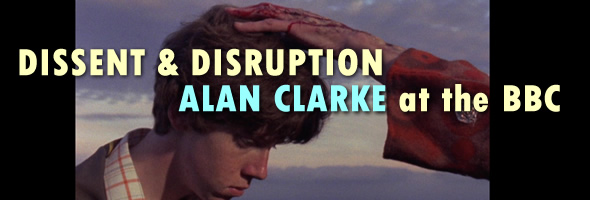
Directed by Alan Clarke
BFI (Blu-ray & DVD) (UK RB/R2 HD/PAL)

Directed by Alan Clarke
BFI (Blu-ray & DVD) (UK RB/R2 HD/PAL)
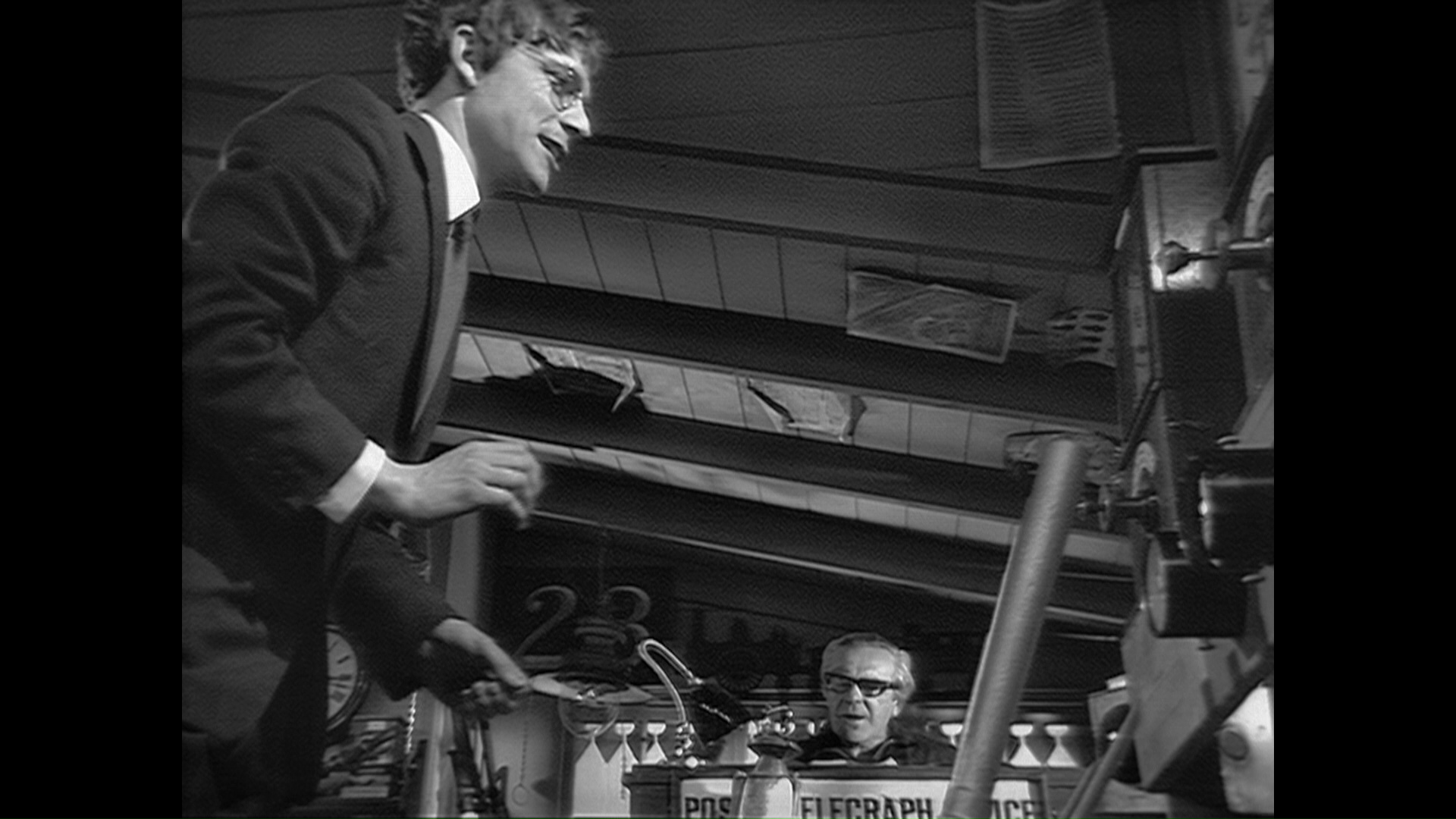 Disc one starts with the earliest surviving Clarke material from the BBC including the recently discovered George’s Room (1967), which was previously considered partially lost.
Disc one starts with the earliest surviving Clarke material from the BBC including the recently discovered George’s Room (1967), which was previously considered partially lost.
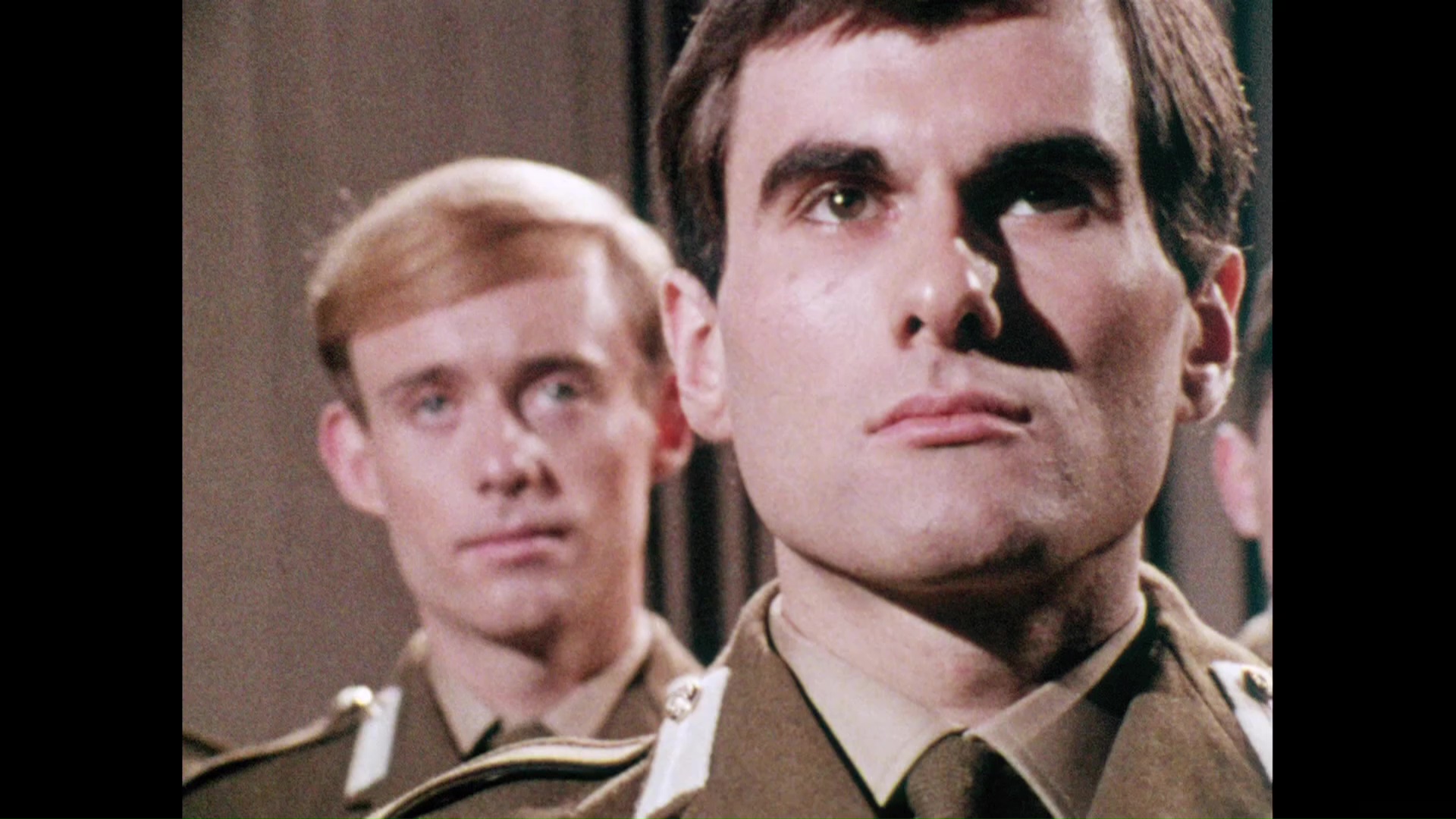 in Lair of the White Worm and Revolution) mock him mercilessly as little better than a peeping tom, but the actual train ride puts him in touch with others who are at least as fixated and maladjusted as he is. It's interesting how this tackles the sadder side of what might be termed fan culture today, with some well-chosen music by The Kinks giving it some extra kick despite an overly protracted running time. Then it's back to color and 16mm again for Sovereign’s Company (1970, 76 mins.), a slicker production for The Wednesday Play with a very troubling look at the military training mentality among young men. Here we follow young military academy inductee Cantfield (Gareth Forwood), who comes from a long line of honorable servicemen including an intimidating grandfather noted for his time in India. However, the environment proves to be more than he bargained for, with his cowardly nature forcing him to camouflage himself -- particularly in his complex relationship with his fellow newcomers as hazing, bullying, and intimidation lead to a violent, reactionary turn of events. Extras here include a gallery of Clarke's early stage work at The Questors Theatre in Ealing, London in the mid-'60s, where he apparently caused a stir several times, and the first part of "Alan Clarke: Out of His Own Light," a series of featurettes continued on all of the other discs. Running 31 minutes, this first installment lays the groundwork for his establishment as a filmmaker with Moffat, author and Clarke biographer Richard Kelly, daughter Molly Clarke, sister Norma McMinn, former partner Jane Harris, friend Grenville Middleton, writers Roy Minton and David Yallop, director Paul Greengrass, The Questors Theatre's Carla Field, producer Stella Richman, and actors Alan Chambers, Angela Pleasence, Richard O'Callaghan, and Ken Ratcliffe laying out the details from his childhood through his theatrical ventures and into his early plays for television, all united by his fondness for unusual characters with a melancholy bent.
in Lair of the White Worm and Revolution) mock him mercilessly as little better than a peeping tom, but the actual train ride puts him in touch with others who are at least as fixated and maladjusted as he is. It's interesting how this tackles the sadder side of what might be termed fan culture today, with some well-chosen music by The Kinks giving it some extra kick despite an overly protracted running time. Then it's back to color and 16mm again for Sovereign’s Company (1970, 76 mins.), a slicker production for The Wednesday Play with a very troubling look at the military training mentality among young men. Here we follow young military academy inductee Cantfield (Gareth Forwood), who comes from a long line of honorable servicemen including an intimidating grandfather noted for his time in India. However, the environment proves to be more than he bargained for, with his cowardly nature forcing him to camouflage himself -- particularly in his complex relationship with his fellow newcomers as hazing, bullying, and intimidation lead to a violent, reactionary turn of events. Extras here include a gallery of Clarke's early stage work at The Questors Theatre in Ealing, London in the mid-'60s, where he apparently caused a stir several times, and the first part of "Alan Clarke: Out of His Own Light," a series of featurettes continued on all of the other discs. Running 31 minutes, this first installment lays the groundwork for his establishment as a filmmaker with Moffat, author and Clarke biographer Richard Kelly, daughter Molly Clarke, sister Norma McMinn, former partner Jane Harris, friend Grenville Middleton, writers Roy Minton and David Yallop, director Paul Greengrass, The Questors Theatre's Carla Field, producer Stella Richman, and actors Alan Chambers, Angela Pleasence, Richard O'Callaghan, and Ken Ratcliffe laying out the details from his childhood through his theatrical ventures and into his early plays for television, all united by his fondness for unusual characters with a melancholy bent.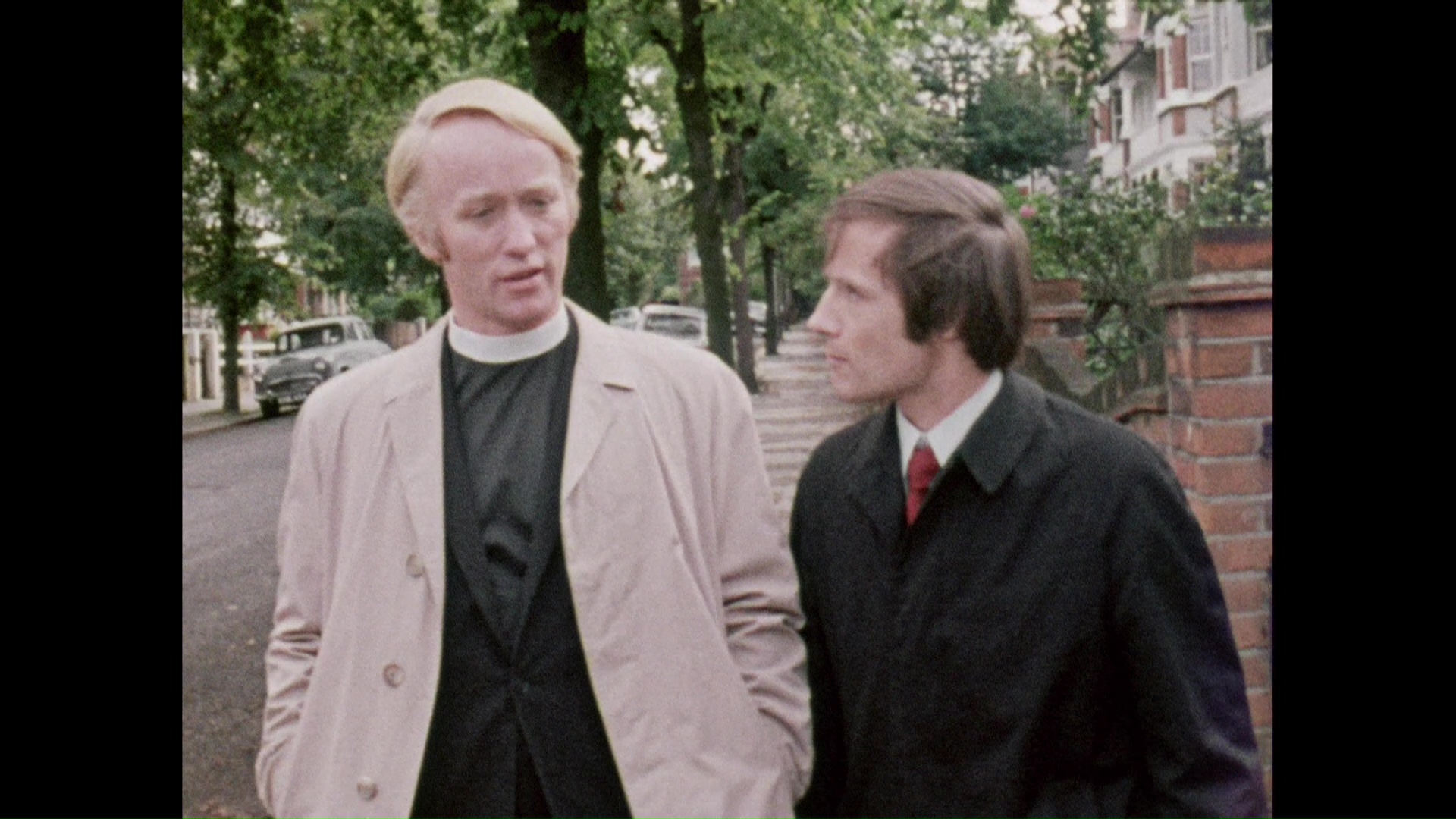 On to disc two, the Play for Today drama The Hallelujah Handshake (1970, 75m.) dissects the social operations of a village congregation where devout faith contrasts with rowdy activity at the local pub. The opening sequence featuring parishioners' voice over thoughts during prayer (about sports, house chores, and cooking) is a taste of what's to come as a young man named Henry (Tony Calvin) enthusiastically ingratiates himself with the churchgoers, despite indications that he is not all that he appears. Even once all has been revealed at the end, it's hard to judge Henry too harshly as his outside status and loneliness are established right from the beginning, and the script by Colin Welland (a future Oscar winner for Chariots of Fire) is an incisive and fascinating piece of work that bears comparison to the more fantastical Brimstone & Treacle. The 16mm filming is solid with that somewhat pale and rough early '70s veneer, nicely recaptured here for a title only occasionally revived since its original airing. Sharing space on the same disc is the TV feature To Encourage the Others (1972, 103m.), a version of the true story later made into a theatrical feature by Peter Medak as Let Him Have It. Here the pivotal shooting of a police officer kicks off the story with the mentally disabled Derek Bentley (Charles Bolton) taking the fall for a gunshot actually fired by his 16-year-old best friend, Chris Craig (Billy Hamon). Whether Bentley understood what was going on and egged Craig on is the crux of the
On to disc two, the Play for Today drama The Hallelujah Handshake (1970, 75m.) dissects the social operations of a village congregation where devout faith contrasts with rowdy activity at the local pub. The opening sequence featuring parishioners' voice over thoughts during prayer (about sports, house chores, and cooking) is a taste of what's to come as a young man named Henry (Tony Calvin) enthusiastically ingratiates himself with the churchgoers, despite indications that he is not all that he appears. Even once all has been revealed at the end, it's hard to judge Henry too harshly as his outside status and loneliness are established right from the beginning, and the script by Colin Welland (a future Oscar winner for Chariots of Fire) is an incisive and fascinating piece of work that bears comparison to the more fantastical Brimstone & Treacle. The 16mm filming is solid with that somewhat pale and rough early '70s veneer, nicely recaptured here for a title only occasionally revived since its original airing. Sharing space on the same disc is the TV feature To Encourage the Others (1972, 103m.), a version of the true story later made into a theatrical feature by Peter Medak as Let Him Have It. Here the pivotal shooting of a police officer kicks off the story with the mentally disabled Derek Bentley (Charles Bolton) taking the fall for a gunshot actually fired by his 16-year-old best friend, Chris Craig (Billy Hamon). Whether Bentley understood what was going on and egged Craig on is the crux of the 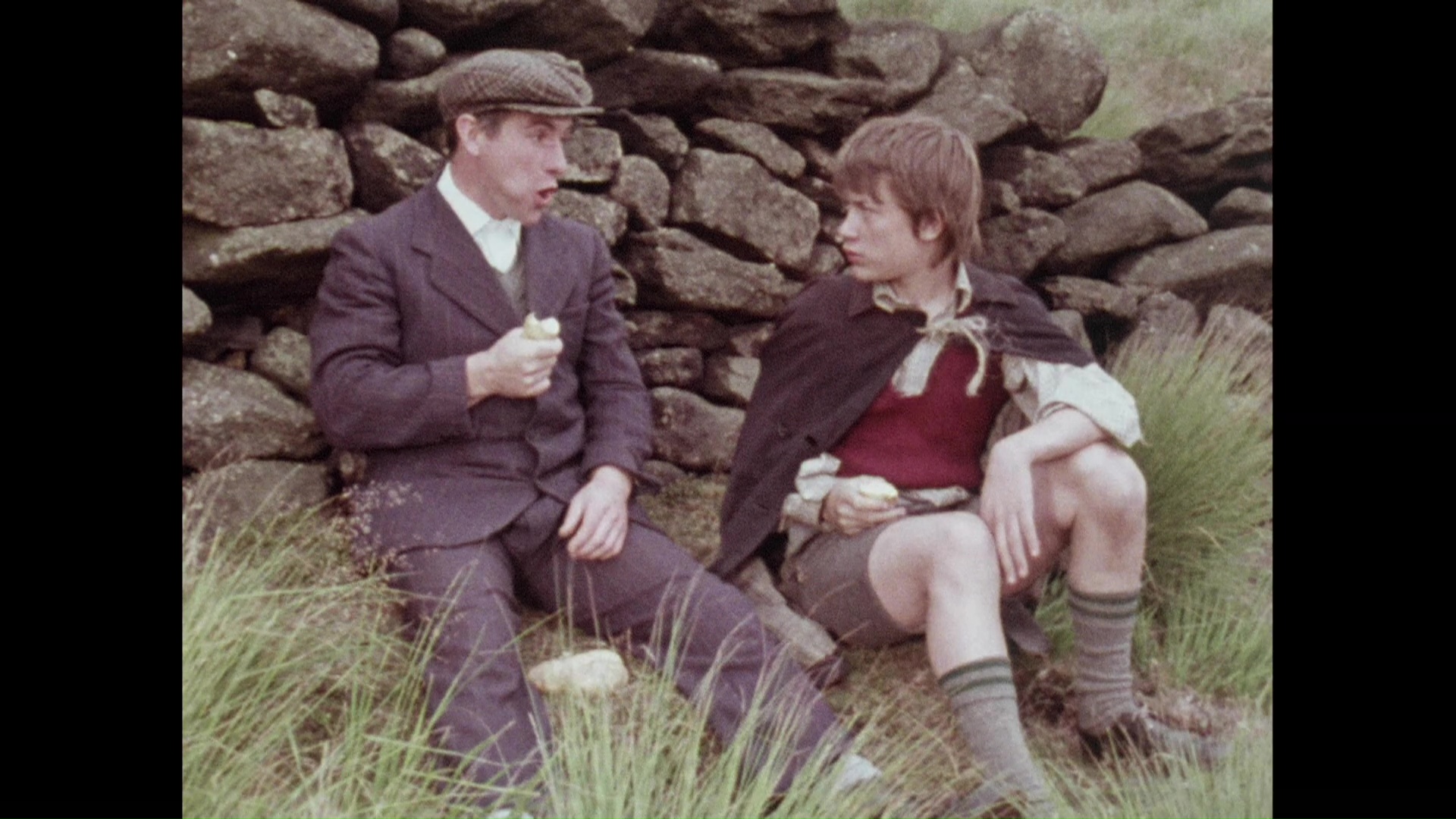 trial, whose outcome had a seismic impact on the British justice system. It's quite astonishing here to see how many visual cues were carried over for the Medak film, and while no one here hits the acting of Christopher Eccleston in the '91 version, all of the performers are quite solid for what amounts to more of a courtroom drama take on the material. The SD video production looks less impressive than its companion film here, but considering the material it's quite gratifying for a title that was once very difficult to see at all. An optional intro by actor and writer David Leland (a longtime Clarke collaborator) is also included, while part 2 of "Out of His Own Light" (13 mins.) has Kelly, Molly Clarke, Harris, Richman, writer David Rudkin, producer Mark Shivas, Greengrass, actor Peter Whelan, and producer David Rose giving a general overview of Clarke's interaction with actors who instinctively understood him as well as his cinematic tastes, such as a fondness for Antonioni.
trial, whose outcome had a seismic impact on the British justice system. It's quite astonishing here to see how many visual cues were carried over for the Medak film, and while no one here hits the acting of Christopher Eccleston in the '91 version, all of the performers are quite solid for what amounts to more of a courtroom drama take on the material. The SD video production looks less impressive than its companion film here, but considering the material it's quite gratifying for a title that was once very difficult to see at all. An optional intro by actor and writer David Leland (a longtime Clarke collaborator) is also included, while part 2 of "Out of His Own Light" (13 mins.) has Kelly, Molly Clarke, Harris, Richman, writer David Rudkin, producer Mark Shivas, Greengrass, actor Peter Whelan, and producer David Rose giving a general overview of Clarke's interaction with actors who instinctively understood him as well as his cinematic tastes, such as a fondness for Antonioni. 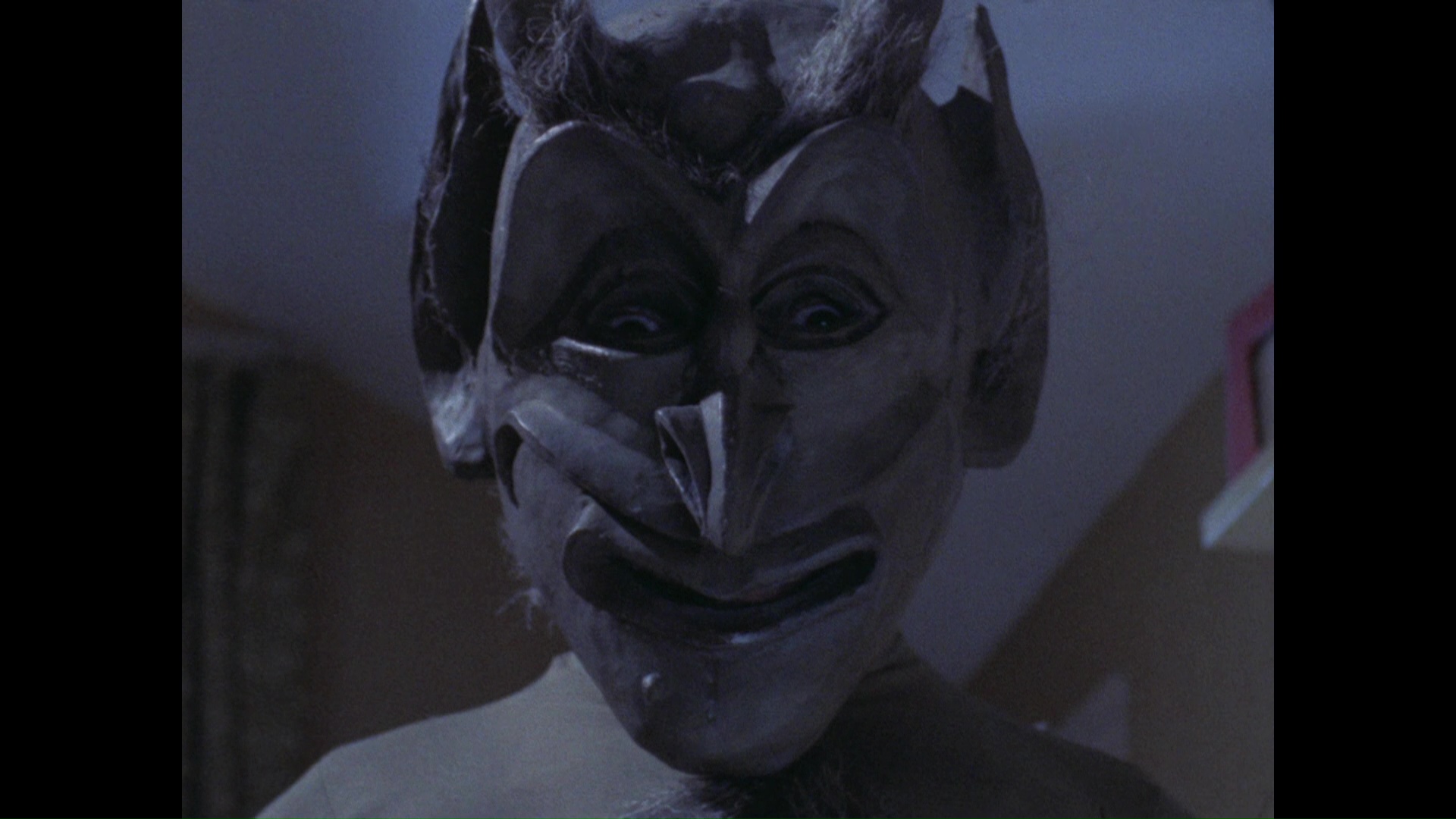
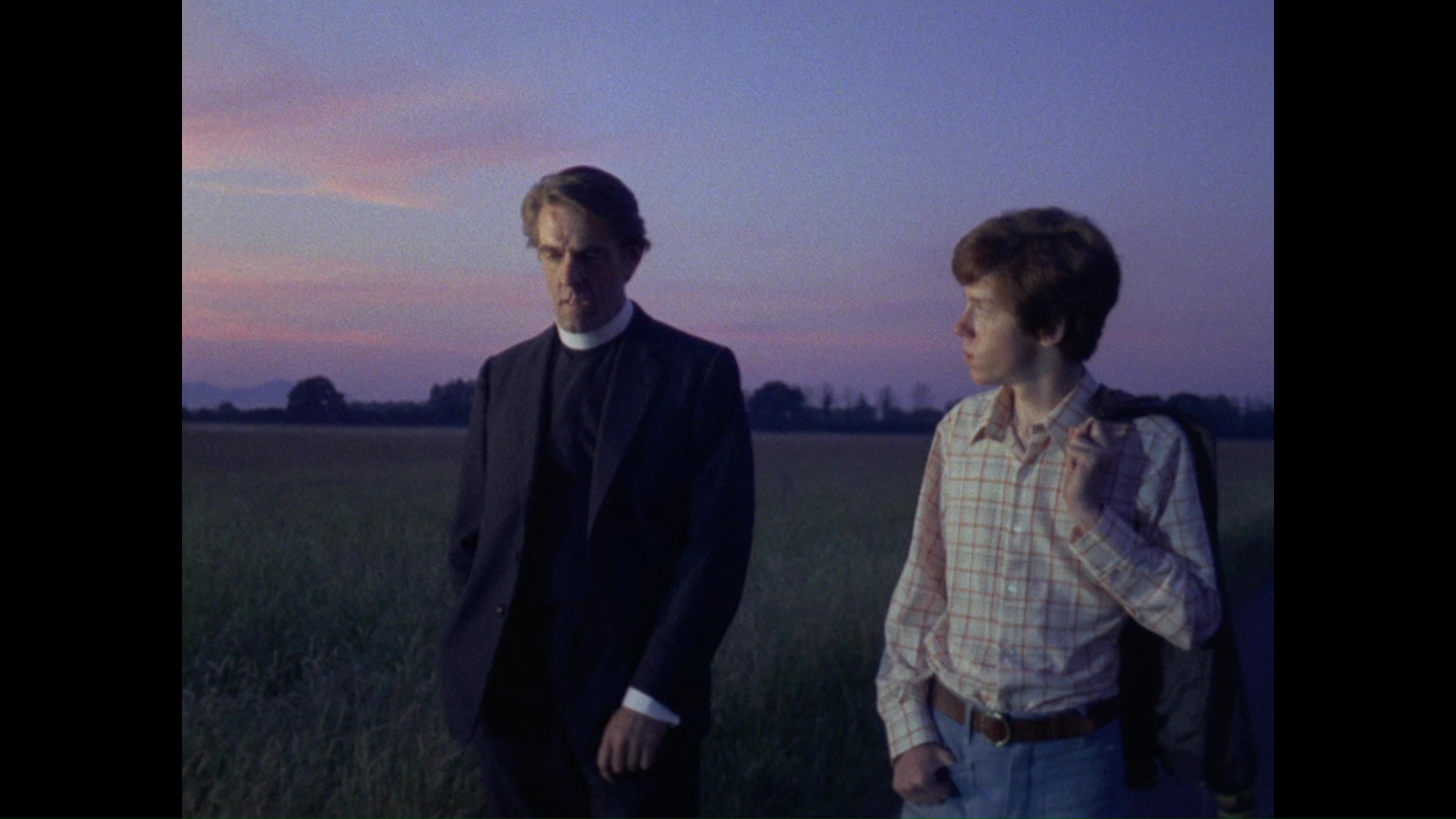 Easily the most anticipated title in this set is Penda’s Fen (1974, 88m.), which is also available as standalone Blu-ray and DVD editions. Never released on video before in any format and seen only via its original broadcast and very dupey bootleg copies, this is a startling, intense fantasia orignally shown as an episode of Play for Today. Written by playwright David Rudkin, the enigmatic story revolves around adolescent Stephen (Spencer Banks), a lad who's fixated on the music of Edward Elgar (which he plays full blast in his bedroom) and becomes besieged by intense visions of pre-Christian English paganism including the ancient King Penda, with various angels and jet-black demons thrown into the mix. His vicar father offers some unorthodox viewpoints of his own as the boy struggles to determine his own identity, both spiritually and sexually. Definitely an unusual undertaking for Clarke, this strays closer to Ken Russell territory than anything else he directed and still packs a visceral punch even when you aren't entirely sure what it all means. It's a real joy seeing this filmed production in immaculate quality, looking absolutely pristine and far better than anyone has ever seen it before. The shots of the English countryside are especially striking, with magic hour lighting in particular making this a real visual showcase. It also makes it clearer how this operates as a sort of spiritual relative to Malpertuis and Dario Argento's Inferno with its ideas of ancient, potentially sinister religions and cultures lurking inside the skin of the current one. Paired up on the same disc is The Love-Girl and the Innocent (1973, 127m.), a Play of the Month production adapted from a Aleksandr Solzhenitsyn play. A very young Patrick Stewart can be seen here among a solid cast including Gabrielle Lloyd (Sleepy Hollow) and TV vet Richard Durden about a week in the lives of prisoners serving a decade-long sentence in a Stalin-created gulag in 1945. Among the many characters, the main focus is the honest Nemov (David Leland) and Lyuba (Lloyd), who strike up a tentative romance despite the fact that she has to resort to desperate measures for better living conditions. This stark and dramatic production was produced on PAL video and is bumped up here, though it actually looks quite solid for what it is. The sole extra here is part 4 of "Alan Clarke: Out of His Own Light," which runs 18 minutes and features Leland, set builder Mike Hagen, Rose,
Easily the most anticipated title in this set is Penda’s Fen (1974, 88m.), which is also available as standalone Blu-ray and DVD editions. Never released on video before in any format and seen only via its original broadcast and very dupey bootleg copies, this is a startling, intense fantasia orignally shown as an episode of Play for Today. Written by playwright David Rudkin, the enigmatic story revolves around adolescent Stephen (Spencer Banks), a lad who's fixated on the music of Edward Elgar (which he plays full blast in his bedroom) and becomes besieged by intense visions of pre-Christian English paganism including the ancient King Penda, with various angels and jet-black demons thrown into the mix. His vicar father offers some unorthodox viewpoints of his own as the boy struggles to determine his own identity, both spiritually and sexually. Definitely an unusual undertaking for Clarke, this strays closer to Ken Russell territory than anything else he directed and still packs a visceral punch even when you aren't entirely sure what it all means. It's a real joy seeing this filmed production in immaculate quality, looking absolutely pristine and far better than anyone has ever seen it before. The shots of the English countryside are especially striking, with magic hour lighting in particular making this a real visual showcase. It also makes it clearer how this operates as a sort of spiritual relative to Malpertuis and Dario Argento's Inferno with its ideas of ancient, potentially sinister religions and cultures lurking inside the skin of the current one. Paired up on the same disc is The Love-Girl and the Innocent (1973, 127m.), a Play of the Month production adapted from a Aleksandr Solzhenitsyn play. A very young Patrick Stewart can be seen here among a solid cast including Gabrielle Lloyd (Sleepy Hollow) and TV vet Richard Durden about a week in the lives of prisoners serving a decade-long sentence in a Stalin-created gulag in 1945. Among the many characters, the main focus is the honest Nemov (David Leland) and Lyuba (Lloyd), who strike up a tentative romance despite the fact that she has to resort to desperate measures for better living conditions. This stark and dramatic production was produced on PAL video and is bumped up here, though it actually looks quite solid for what it is. The sole extra here is part 4 of "Alan Clarke: Out of His Own Light," which runs 18 minutes and features Leland, set builder Mike Hagen, Rose, 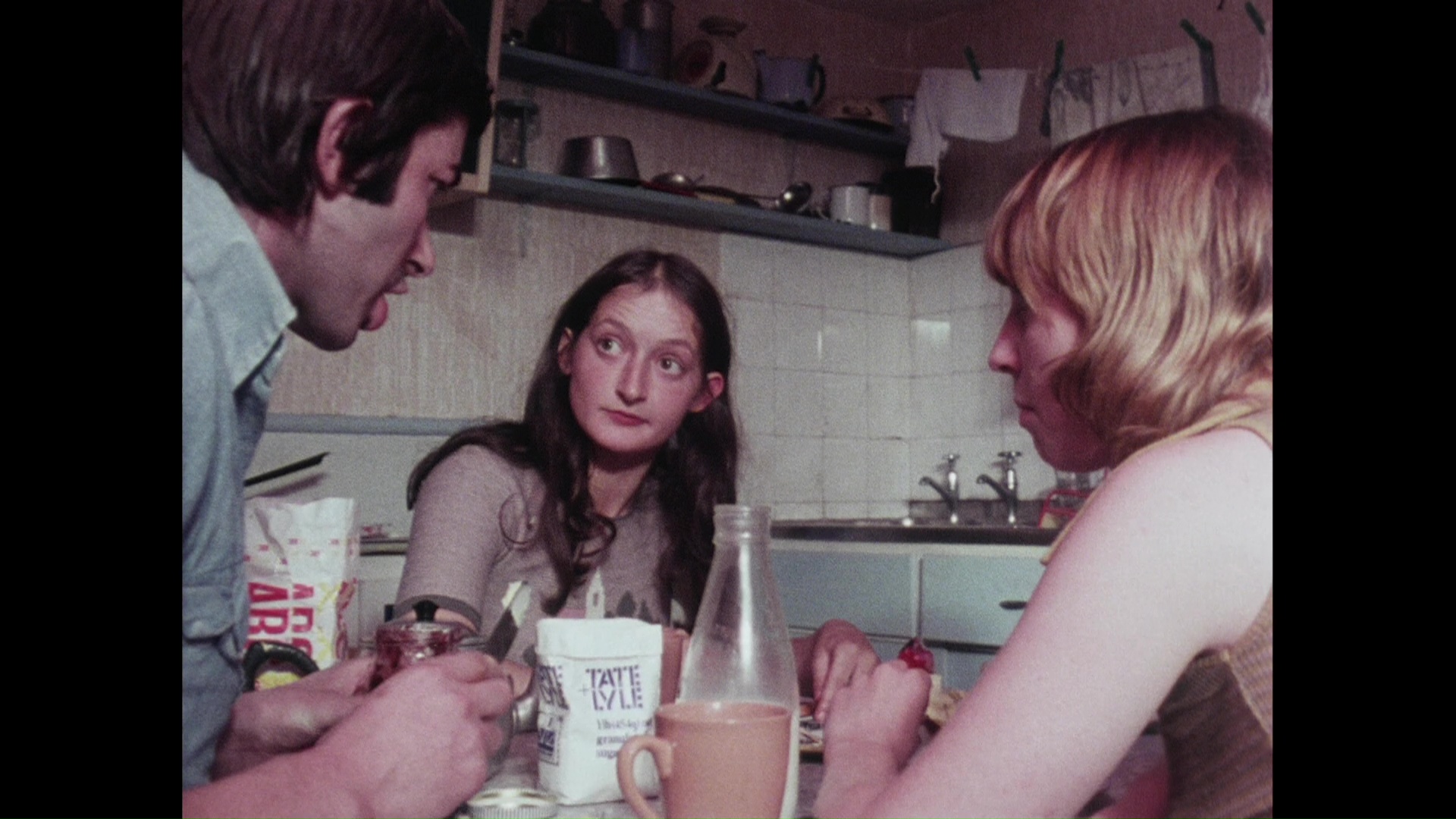 Schumann, and Hare recalling both of these challenging productions with a focus on how shooting away from London providing
Schumann, and Hare recalling both of these challenging productions with a focus on how shooting away from London providing 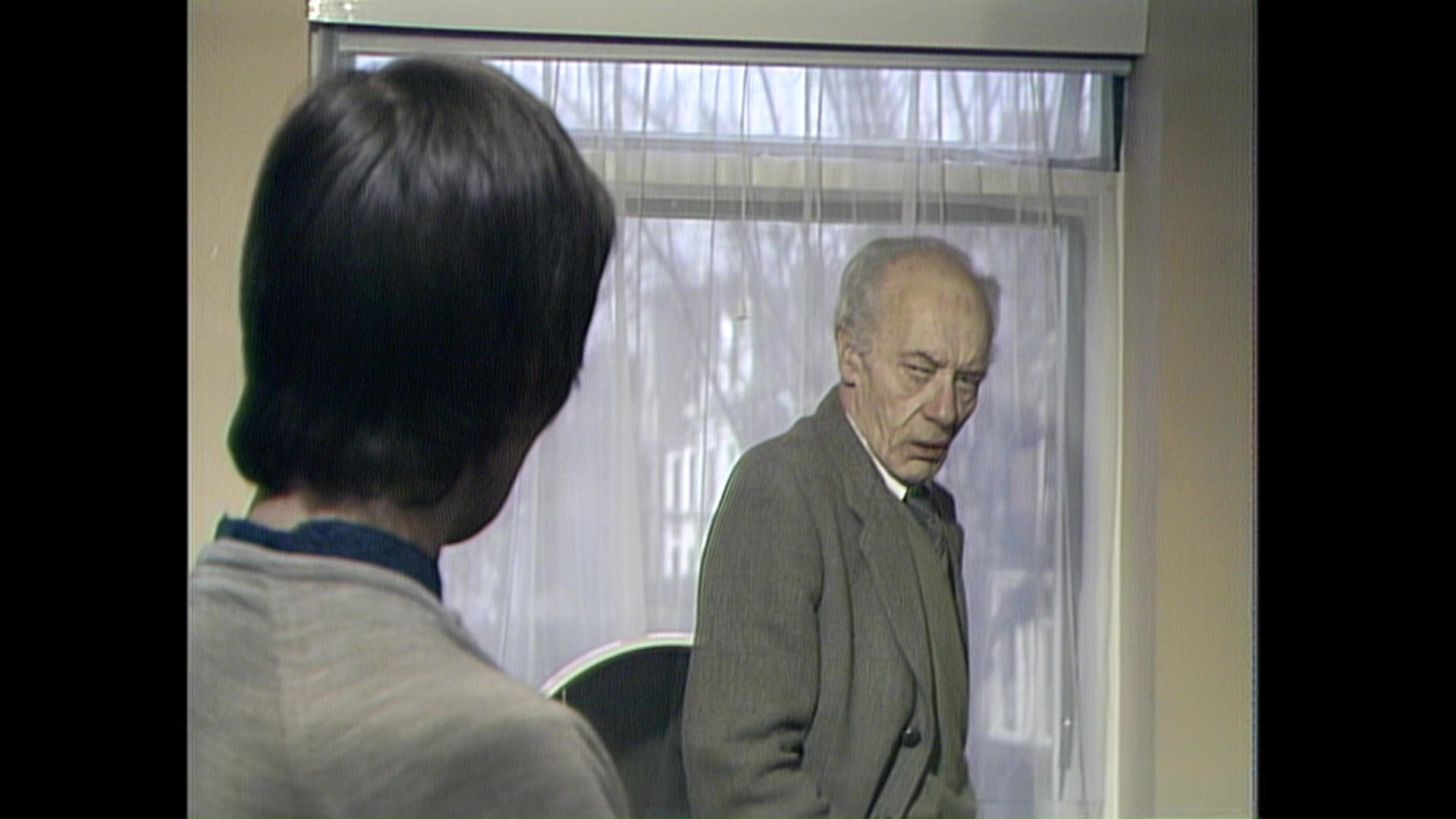 some security from BBC oversight.
some security from BBC oversight.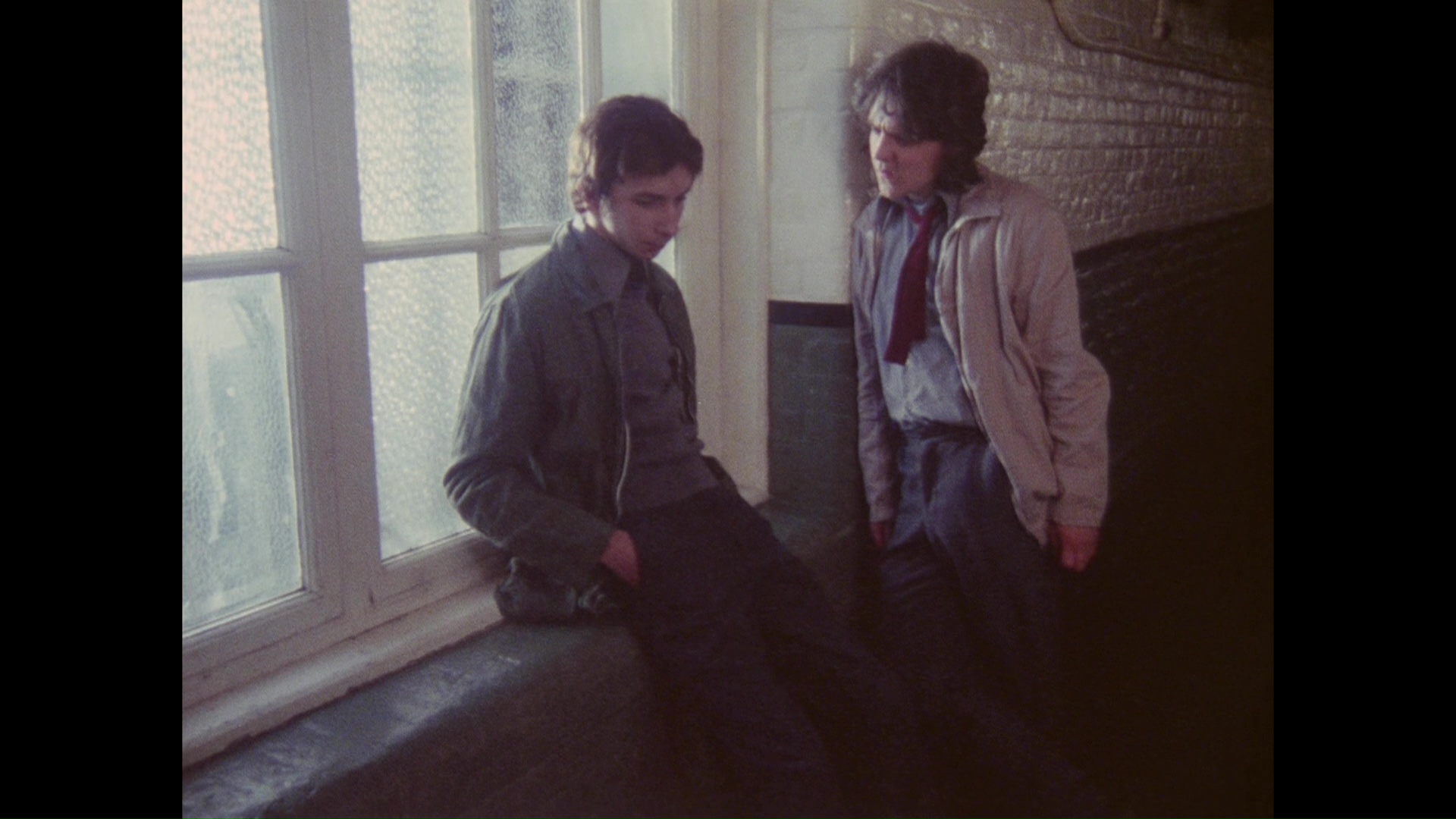 And now we get to one of the big landmarks in Clarke's career, Scum (1977, 74m.), an unflinching look at life in a boys' correctional institution. The broadcast proved to be so
And now we get to one of the big landmarks in Clarke's career, Scum (1977, 74m.), an unflinching look at life in a boys' correctional institution. The broadcast proved to be so 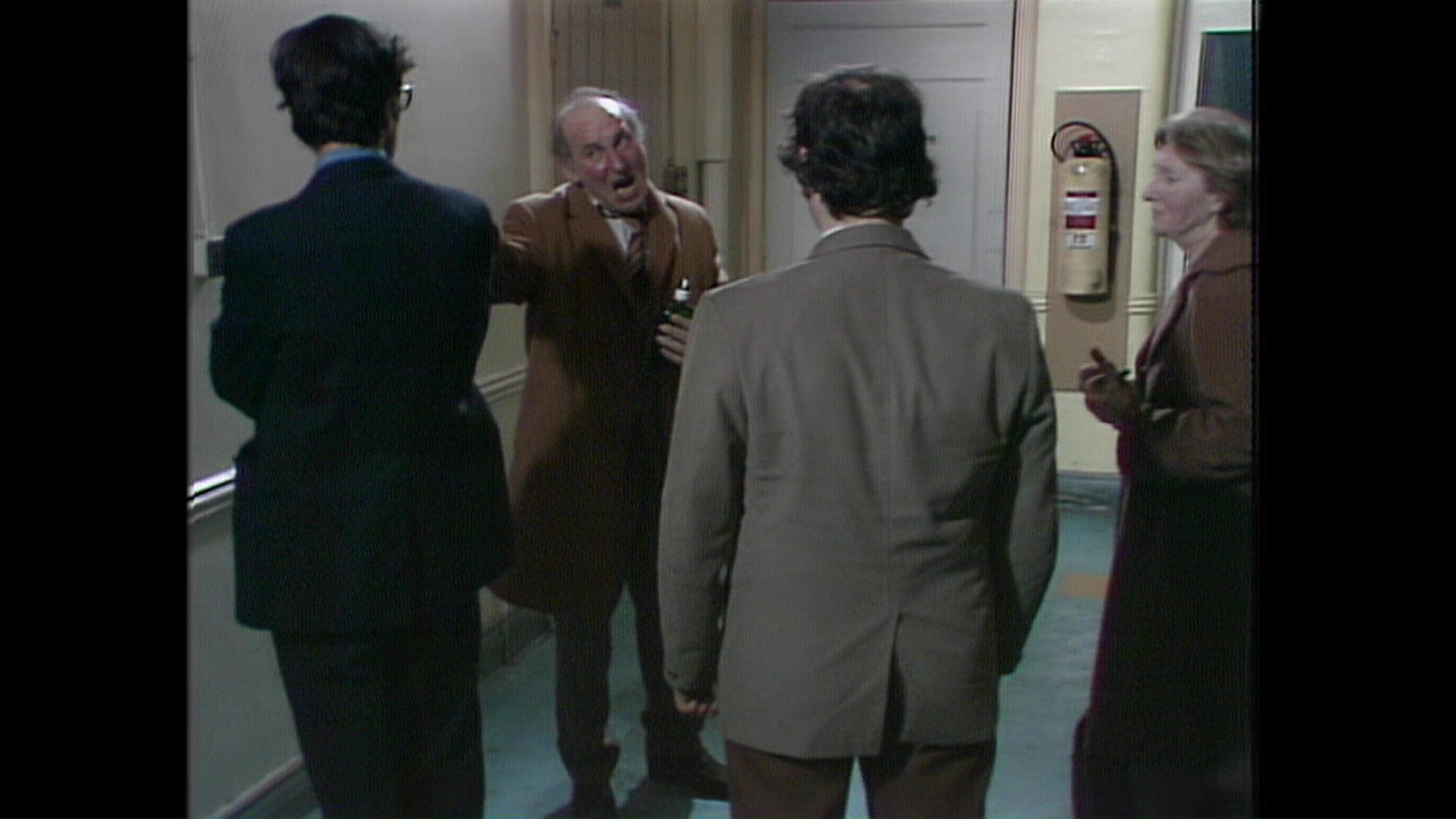 controversial it was banned by the BBC, prompting Clarke to turn it into a feature film with many of the same actors, with debate continuing as to which version is the more effective. However, there's little doubt that this first TV presentation is the more extreme of the two with an overt depiction of the sexual class system that emerges and the abuse that regularly goes on inside these walls. Ray Winstone gets a fantastic role as Carlin, who climbs his way up the ladder through brute force in an effort to control his surroundings and just survive day to day. Both versions were released on US DVD by Blue Underground in a two-disc set, with the BBC one getting an audio commentary with Matheson and actors Phil Daniels and David Threlfall plus a selected scene commentary by Winstone. Here the main complete commentary is carried over, while new extras include a Leland intro from the 1991 BBC broadcast, a Tonight discussion (10 mins.) about the controversy over the banned broadcast and its illicit screening for critics, and a 46-minute episode of Arena, "When Is a Play Not a Play?" about the contrast between the normal passive nature of TV consumption and the issues-oriented, aggressive dramas like this one that were causing such a stir at the time. Clarke himself pops up for some interview footage as well, explaining how a realistic drama differs from a documentary. Also on the same disc is the thematically appropriate Funny Farm (1975, 92m.), a matter-of-fact Play for Today depiction of everyday life in a mental institution where the living conditions and treatments aren't always conducive to helping the inmates recover. With its SD video lensing and more traditional stagey execution, this plays more like a '70s updating of the Vincente Minnelli film The Cobweb than the confrontational masterpiece on the same disc; however, there's some meaty material here as we get to know all of the older patients and feel sympathy for their plight with little chance of getting outside again. Part 6 of "Out of His Own Light" (25 mins.) has Kelly, Minton, Shivas, Matheson, Winstone, Daniels, Yallop, and Middleton covering the intense, sometimes grueling production of both titles and the catastrophic end result for the BBC that forced an even angrier Clarke to switch to the
controversial it was banned by the BBC, prompting Clarke to turn it into a feature film with many of the same actors, with debate continuing as to which version is the more effective. However, there's little doubt that this first TV presentation is the more extreme of the two with an overt depiction of the sexual class system that emerges and the abuse that regularly goes on inside these walls. Ray Winstone gets a fantastic role as Carlin, who climbs his way up the ladder through brute force in an effort to control his surroundings and just survive day to day. Both versions were released on US DVD by Blue Underground in a two-disc set, with the BBC one getting an audio commentary with Matheson and actors Phil Daniels and David Threlfall plus a selected scene commentary by Winstone. Here the main complete commentary is carried over, while new extras include a Leland intro from the 1991 BBC broadcast, a Tonight discussion (10 mins.) about the controversy over the banned broadcast and its illicit screening for critics, and a 46-minute episode of Arena, "When Is a Play Not a Play?" about the contrast between the normal passive nature of TV consumption and the issues-oriented, aggressive dramas like this one that were causing such a stir at the time. Clarke himself pops up for some interview footage as well, explaining how a realistic drama differs from a documentary. Also on the same disc is the thematically appropriate Funny Farm (1975, 92m.), a matter-of-fact Play for Today depiction of everyday life in a mental institution where the living conditions and treatments aren't always conducive to helping the inmates recover. With its SD video lensing and more traditional stagey execution, this plays more like a '70s updating of the Vincente Minnelli film The Cobweb than the confrontational masterpiece on the same disc; however, there's some meaty material here as we get to know all of the older patients and feel sympathy for their plight with little chance of getting outside again. Part 6 of "Out of His Own Light" (25 mins.) has Kelly, Minton, Shivas, Matheson, Winstone, Daniels, Yallop, and Middleton covering the intense, sometimes grueling production of both titles and the catastrophic end result for the BBC that forced an even angrier Clarke to switch to the  big screen.
big screen. 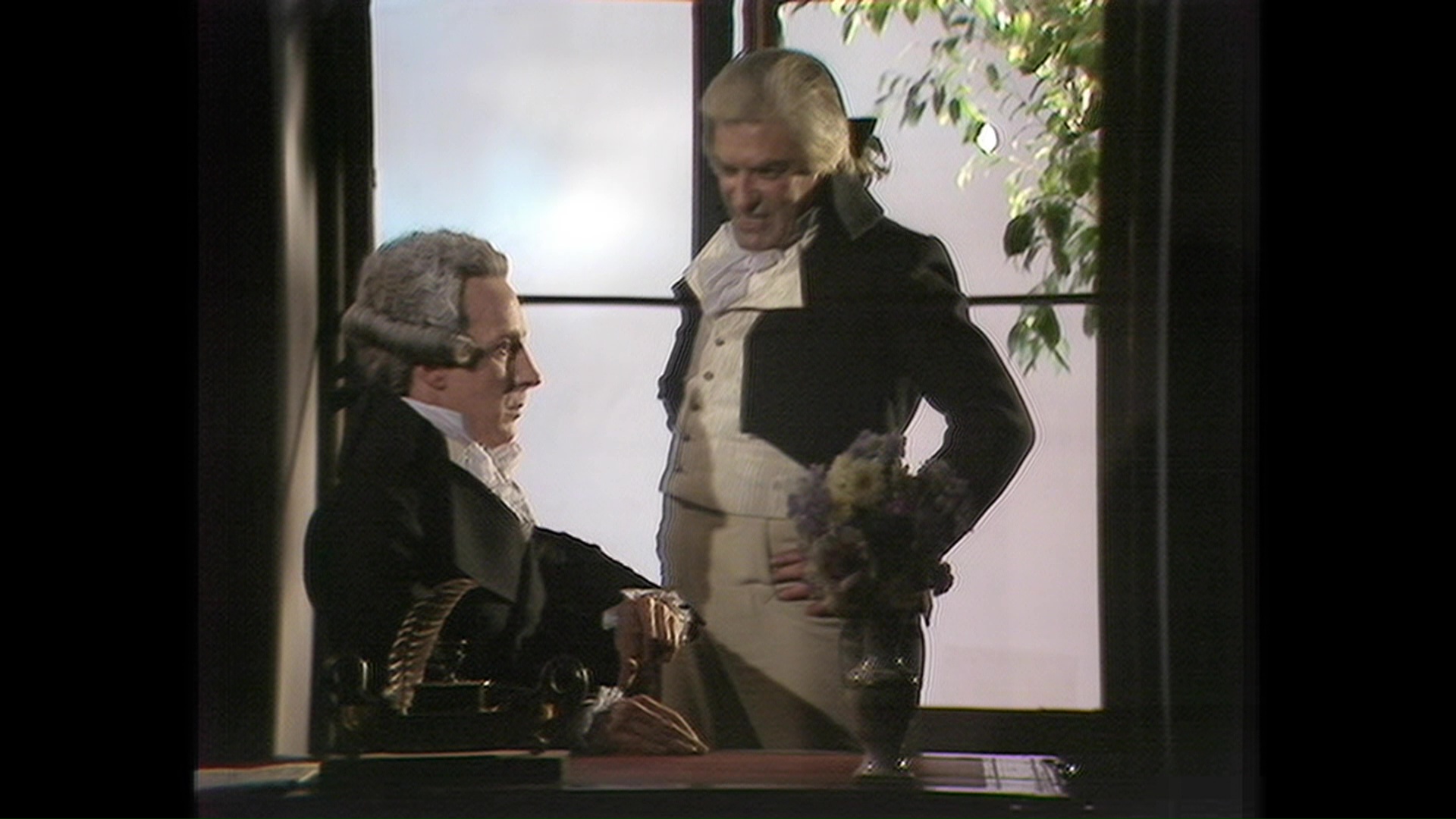 minutes of B&W interview and organized speech outtakes (as much as the film itself!), a thorough Dunn-moderated commentary with Jehane Markham (daughter of actor and interviewer/historian David) and cameraman Grenville Middleton, a 20-minute David Markham/Clarke interview about the definitions of dissent and its importance in society, and a gallery of Clarke’s correspondence with the Markhams. Also on the disc is the Play for Today production Nina (1978, 75m.), a showcase for the wonderful actress Eleanor Bron (Bedazzled, Two for the Road) as the titular doctor who's ordered to keep dissident patients under control with excessive, unnecessary medication. She ends up falling for one of them, Yuri (Jack Shepherd), and together they go to the West with her leaving behind her son -- temporarily, she believes. Their attempts to speak out about the Soviet conditions are complicated when their own relationship takes a suffocating turn, mirroring all too closely real life events witnessed by Jehane Markham (who wrote the screenplay). The filmed production looks low budget, not surprisingly, but the transfer features a sterling HD presentation of its original look, rough grain and all. Part 7 of "Out of His Own Light" (18 mins.) brings together Kelly, Leland, director Stephen Frears, Middleton, Jehane Markham, Hare, Minton, actor Phil Davis, and Daniels, going into more depth about David Markham's efforts to get Bukovsky out and the ways Clarke used his skills and influence to tell both of these stories.
minutes of B&W interview and organized speech outtakes (as much as the film itself!), a thorough Dunn-moderated commentary with Jehane Markham (daughter of actor and interviewer/historian David) and cameraman Grenville Middleton, a 20-minute David Markham/Clarke interview about the definitions of dissent and its importance in society, and a gallery of Clarke’s correspondence with the Markhams. Also on the disc is the Play for Today production Nina (1978, 75m.), a showcase for the wonderful actress Eleanor Bron (Bedazzled, Two for the Road) as the titular doctor who's ordered to keep dissident patients under control with excessive, unnecessary medication. She ends up falling for one of them, Yuri (Jack Shepherd), and together they go to the West with her leaving behind her son -- temporarily, she believes. Their attempts to speak out about the Soviet conditions are complicated when their own relationship takes a suffocating turn, mirroring all too closely real life events witnessed by Jehane Markham (who wrote the screenplay). The filmed production looks low budget, not surprisingly, but the transfer features a sterling HD presentation of its original look, rough grain and all. Part 7 of "Out of His Own Light" (18 mins.) brings together Kelly, Leland, director Stephen Frears, Middleton, Jehane Markham, Hare, Minton, actor Phil Davis, and Daniels, going into more depth about David Markham's efforts to get Bukovsky out and the ways Clarke used his skills and influence to tell both of these stories. 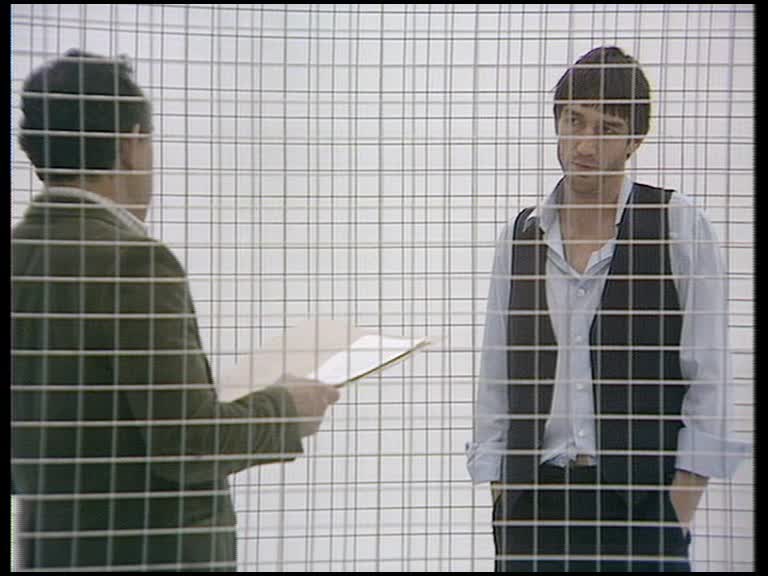 British automotive corporate head (Graham Crowden) and his strongarm
British automotive corporate head (Graham Crowden) and his strongarm 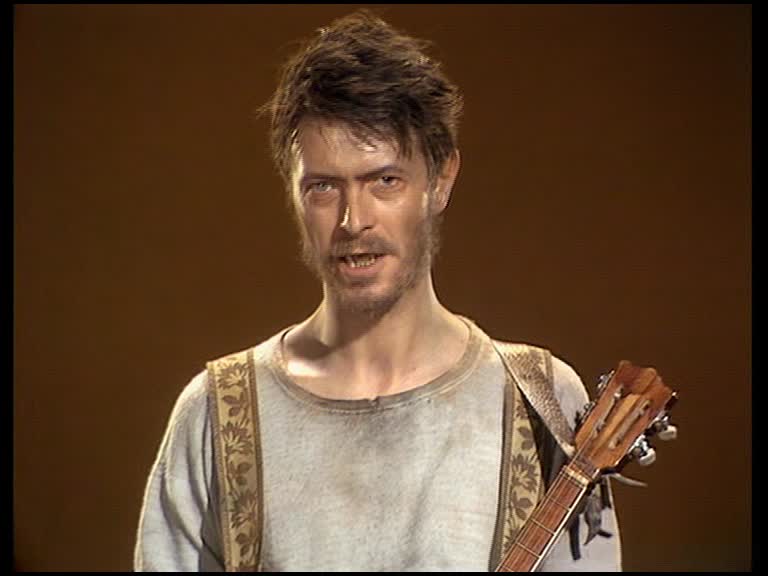 Blake (Tony Doyle) try to get a foothold in the USSR, represented by Kozlov (Beverly Hills Cop's Steven Berkoff). The sometimes vicious quid pro quo raises the stakes higher than expected when laser weapons become bargaining chips, a clear allegory for the dangerous Cold War games being played out for real on the news at the time. This one's also very chatty and static, but it really takes off once Berkoff shows up and injects some welcome wild card energy into the proceedings. Sadly, the depiction of corporate-political chicanery looks downright quaint these days, which gives the film more of a nostalgic air than what was probably intended. Part 8 of "Out of His Own Light" (19 mins.) features designer Stuart Walker, Leland, editor Tariq Anwar, and writer Jehane Markham discussing both productions, with a focus on how tightly Clarke adhered to the text in both cases while encouraging experimentation among the crew.
Blake (Tony Doyle) try to get a foothold in the USSR, represented by Kozlov (Beverly Hills Cop's Steven Berkoff). The sometimes vicious quid pro quo raises the stakes higher than expected when laser weapons become bargaining chips, a clear allegory for the dangerous Cold War games being played out for real on the news at the time. This one's also very chatty and static, but it really takes off once Berkoff shows up and injects some welcome wild card energy into the proceedings. Sadly, the depiction of corporate-political chicanery looks downright quaint these days, which gives the film more of a nostalgic air than what was probably intended. Part 8 of "Out of His Own Light" (19 mins.) features designer Stuart Walker, Leland, editor Tariq Anwar, and writer Jehane Markham discussing both productions, with a focus on how tightly Clarke adhered to the text in both cases while encouraging experimentation among the crew.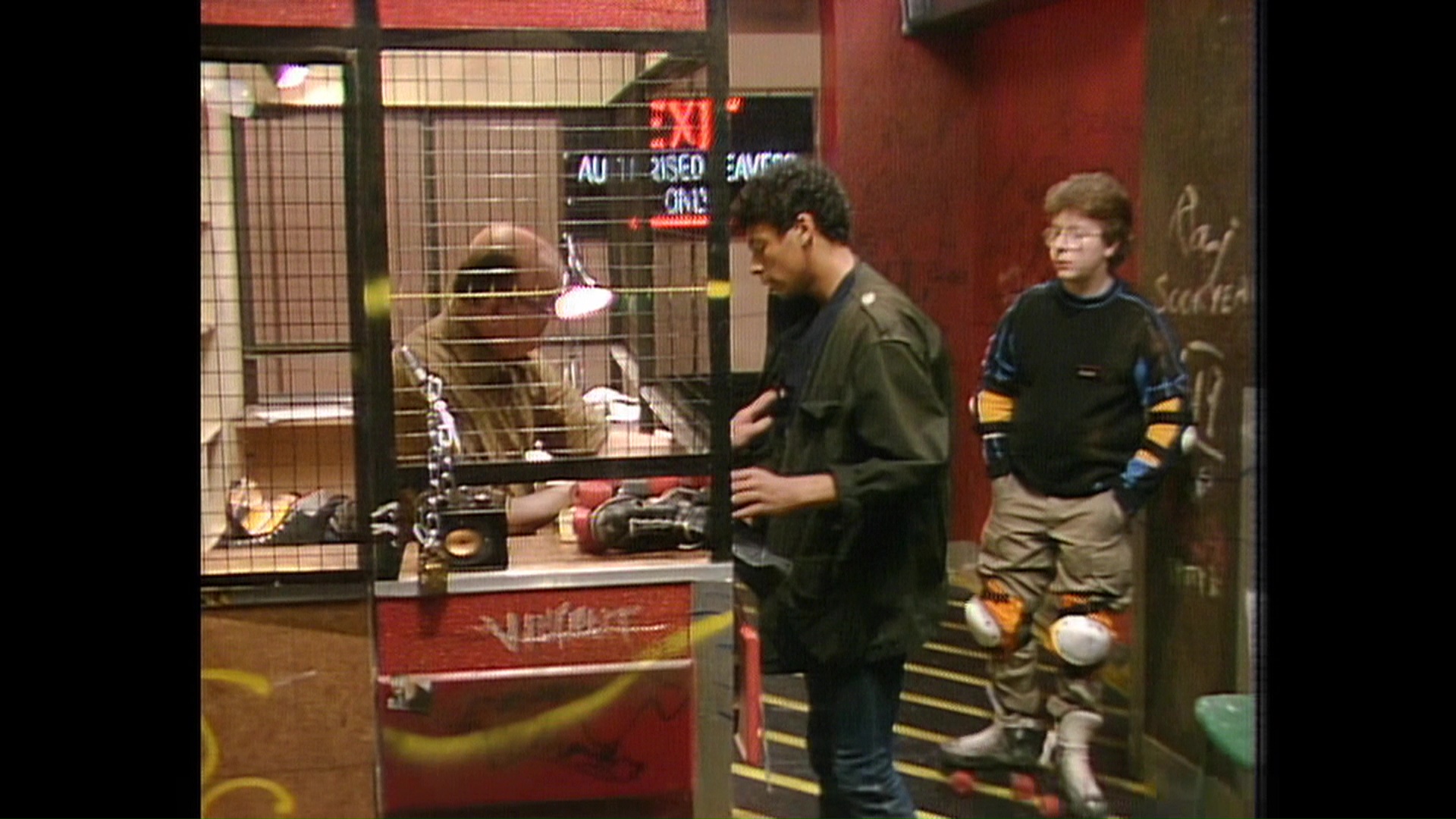
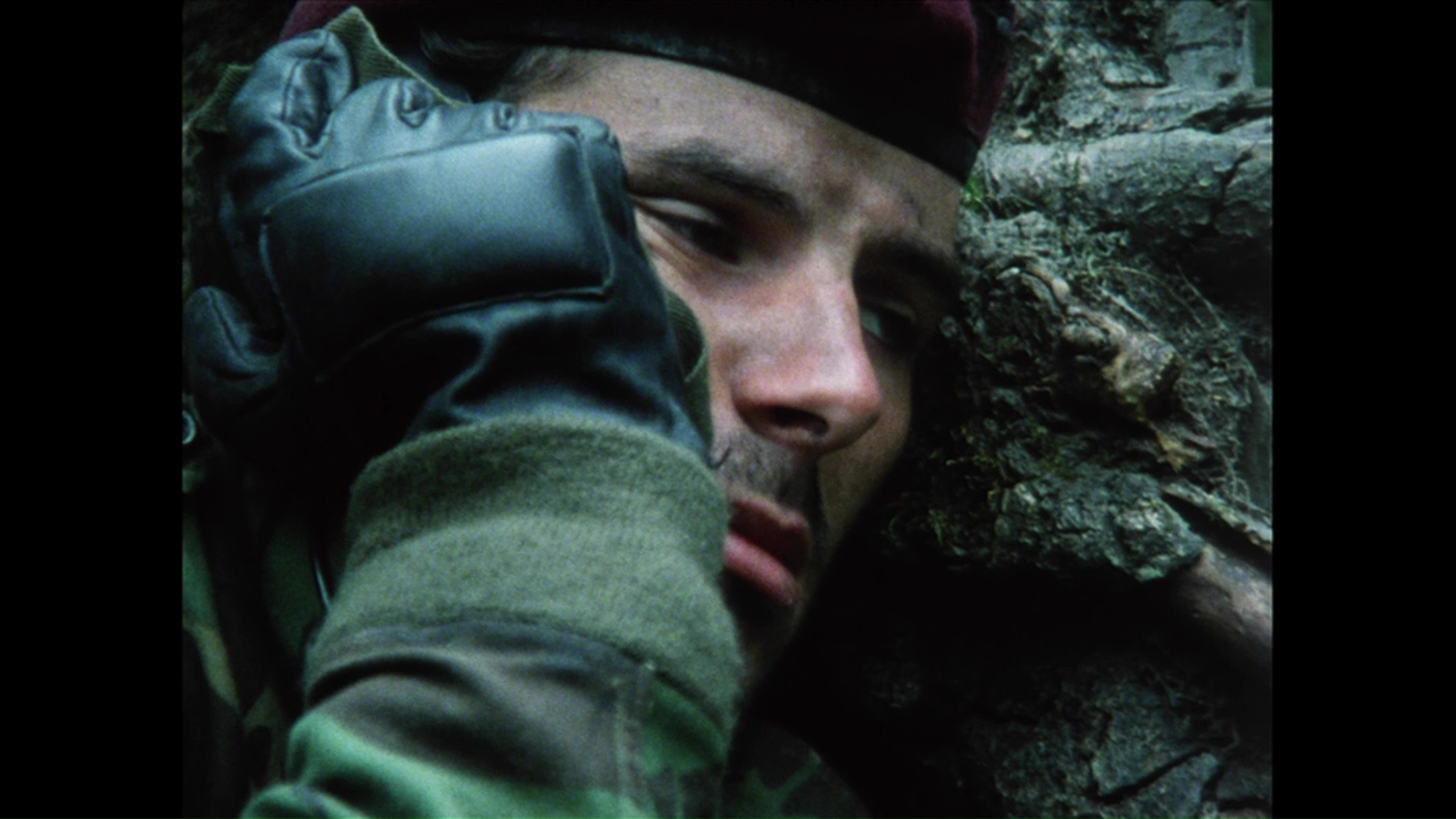 Clarke's mid-'80s work comes next with an odd but effective pairing. Stars of the Roller State Disco (1984, 72m.) is essentially a more grounded, kitchen sink response to the roller disco teen films earlier in the decade. Here some teenagers are coming out of school and about to enter the job force, only to find that the basic training courses being offered for jobs like demolition aren't enough to secure an actual position that will get them by. The twist here is that unemployed kids spend all their time in a skating rink run by the state where they hear job announcements and have to report to an officer on a screen about their qualifications and willingness to relocate. Unrest, bullying, and class consciousness emerge in the graffiti-strewn building, setting up a strange but fascinating social critique of Thatcher-era strife (complete with great vintage arcade games and barely heard pop tunes) that also sets the stage of Clarke's later 1987 surreal pool hall musical, Billy the Kid and the Green Baize Vampire. Extra points for the grim and memorably bloody final scene, about as pointed a statement as you can get. This is another video production upscaled for the Blu-ray, but the source material is in great shape and it looks about as good as SD can get. Then we hit the following year's Contact (1985, 66m.), a dramatic war story for Screen Two about five British paratrooper soldiers traversing the countryside in Northern Ireland. Based on a novel by AFN Clarke (no relation), it's a tense and tight drama running just over an hour with a strong central performance by Sean Chapman, who would soon go on to play the evil Uncle Frank in Hellraiser. The 16mm film production has been beautifully transferred with its original gritty but colorful textures intact, and it's astonishing that this one hasn't had a video release of any kind until now. The film can also be played with an optional Leland intro (recorded for a Clarke BBC retrospective), an in-depth audio commentary by Chapman and Allan Bairstow, or a 22-minute video interview with AFN Clarke about his work on the film after being recruited to adapt it in a restaurant. Part 10 of "Out of His Own Light" (12 mins.) is one of the strongest with actor Gary Oldman, Greengrass, Hare, Leland, Frears, Schumann, Kelly, Matheson, and Chapman covering Clarke's organic camerawork and the specific challenges of mounting Control without many of the normal conventions of narrative film.
Clarke's mid-'80s work comes next with an odd but effective pairing. Stars of the Roller State Disco (1984, 72m.) is essentially a more grounded, kitchen sink response to the roller disco teen films earlier in the decade. Here some teenagers are coming out of school and about to enter the job force, only to find that the basic training courses being offered for jobs like demolition aren't enough to secure an actual position that will get them by. The twist here is that unemployed kids spend all their time in a skating rink run by the state where they hear job announcements and have to report to an officer on a screen about their qualifications and willingness to relocate. Unrest, bullying, and class consciousness emerge in the graffiti-strewn building, setting up a strange but fascinating social critique of Thatcher-era strife (complete with great vintage arcade games and barely heard pop tunes) that also sets the stage of Clarke's later 1987 surreal pool hall musical, Billy the Kid and the Green Baize Vampire. Extra points for the grim and memorably bloody final scene, about as pointed a statement as you can get. This is another video production upscaled for the Blu-ray, but the source material is in great shape and it looks about as good as SD can get. Then we hit the following year's Contact (1985, 66m.), a dramatic war story for Screen Two about five British paratrooper soldiers traversing the countryside in Northern Ireland. Based on a novel by AFN Clarke (no relation), it's a tense and tight drama running just over an hour with a strong central performance by Sean Chapman, who would soon go on to play the evil Uncle Frank in Hellraiser. The 16mm film production has been beautifully transferred with its original gritty but colorful textures intact, and it's astonishing that this one hasn't had a video release of any kind until now. The film can also be played with an optional Leland intro (recorded for a Clarke BBC retrospective), an in-depth audio commentary by Chapman and Allan Bairstow, or a 22-minute video interview with AFN Clarke about his work on the film after being recruited to adapt it in a restaurant. Part 10 of "Out of His Own Light" (12 mins.) is one of the strongest with actor Gary Oldman, Greengrass, Hare, Leland, Frears, Schumann, Kelly, Matheson, and Chapman covering Clarke's organic camerawork and the specific challenges of mounting Control without many of the normal conventions of narrative film. 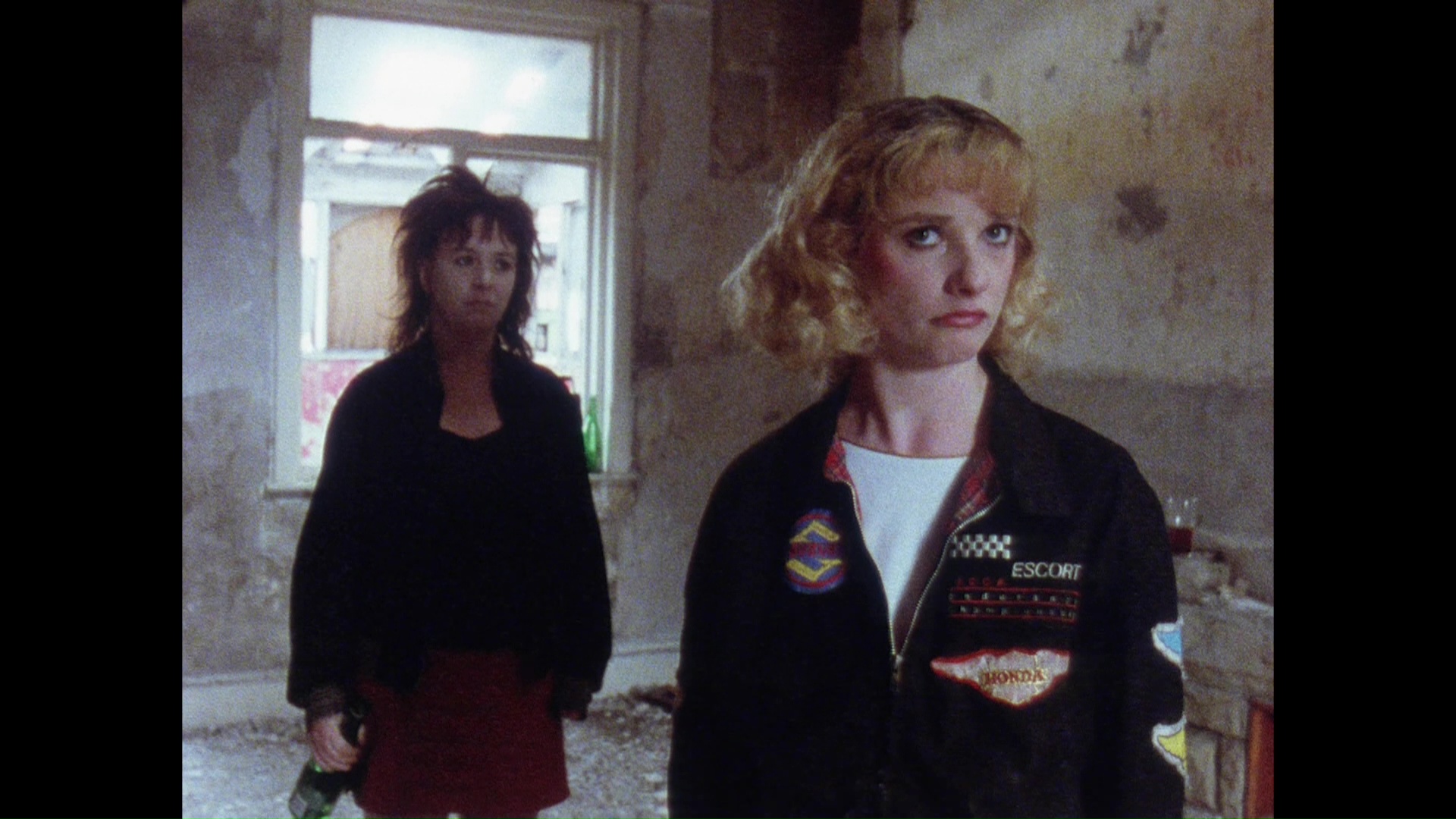 Arthur Ellis, offers a particularly unsettling look at a day in the life of the title character (Vicky Murdock), a drug addict seen early on in a startling extended take walking into her sister's house while carrying a plastic bag and sipping a Coke. As cartoons play on TV, she pulls out a cookie tin packed with money and heroin gear, the tools she uses to first shoot up and then ply her trade at neighbors' houses. Incredibly grim stuff, this may be hard to take
Arthur Ellis, offers a particularly unsettling look at a day in the life of the title character (Vicky Murdock), a drug addict seen early on in a startling extended take walking into her sister's house while carrying a plastic bag and sipping a Coke. As cartoons play on TV, she pulls out a cookie tin packed with money and heroin gear, the tools she uses to first shoot up and then ply her trade at neighbors' houses. Incredibly grim stuff, this may be hard to take  for some viewers with its many scenes of young kids injecting themselves over and over, while the long takes and minimal dialogue (not to mention lack of music score apart from a simple music box ditty) make this a very memorable day in domestic hell. The 16mm film looks true to the source here with a sharp, accurate transfer that preserves the eerie, bleached-out afternoon sunlight in all its dreary intensity, and the film can also be played with an informative new audio commentary with frequent Clarke first assistant director Corin Campbell Hill, moderated by the BFI's Sam Dunn. A denser slate of extras can be found on the same disc for Road (1987, 62m.), a lighter and more profane look at addiction (also made for ScreenPlay) with alcoholic Scullery (Edward Tudor-Pole) guiding a cast of unemployed characters who address the camera on what amounts to a long pub crawl. Originally intended to be produced on sets, the film was instead moved to real locations with elaborate Steadicam work capturing an intense, raucous air that makes this a major highlight of the set. A young David Thewlis, Jane Horrocks (Absolutely Fabulous), and Lesley Sharp are some of the familiar faces here, all of them excellent, and the use of vintage songs is potent as well with Otis Redding's "Try a Little Tenderness" making a nice climactic centerpiece before The Commitments revived it more widely four years later. Hill and Dunn return for an excellent commentary with production designer Stuart Walker, while another Leland TV intro is included along with a 1987 "Open Air" BBC One discussion (26 mins.) about the profuse viewer response to the airing, a 2-minute deleted scene, and a gallery of Clarke on location. Part 11 of "Out of His Own Light" (22 mins.) features a great chat with Murdock about her controversial role and the injection scenes (which were intended to be more realistic than Christiane F.), with additional comments by Hill and Road stories from Anwar, Schumann, Sharpe, Davis, and cameraman John Ward.
for some viewers with its many scenes of young kids injecting themselves over and over, while the long takes and minimal dialogue (not to mention lack of music score apart from a simple music box ditty) make this a very memorable day in domestic hell. The 16mm film looks true to the source here with a sharp, accurate transfer that preserves the eerie, bleached-out afternoon sunlight in all its dreary intensity, and the film can also be played with an informative new audio commentary with frequent Clarke first assistant director Corin Campbell Hill, moderated by the BFI's Sam Dunn. A denser slate of extras can be found on the same disc for Road (1987, 62m.), a lighter and more profane look at addiction (also made for ScreenPlay) with alcoholic Scullery (Edward Tudor-Pole) guiding a cast of unemployed characters who address the camera on what amounts to a long pub crawl. Originally intended to be produced on sets, the film was instead moved to real locations with elaborate Steadicam work capturing an intense, raucous air that makes this a major highlight of the set. A young David Thewlis, Jane Horrocks (Absolutely Fabulous), and Lesley Sharp are some of the familiar faces here, all of them excellent, and the use of vintage songs is potent as well with Otis Redding's "Try a Little Tenderness" making a nice climactic centerpiece before The Commitments revived it more widely four years later. Hill and Dunn return for an excellent commentary with production designer Stuart Walker, while another Leland TV intro is included along with a 1987 "Open Air" BBC One discussion (26 mins.) about the profuse viewer response to the airing, a 2-minute deleted scene, and a gallery of Clarke on location. Part 11 of "Out of His Own Light" (22 mins.) features a great chat with Murdock about her controversial role and the injection scenes (which were intended to be more realistic than Christiane F.), with additional comments by Hill and Road stories from Anwar, Schumann, Sharpe, Davis, and cameraman John Ward.  we hit perhaps Clarke's biggest title and the one most commonly available on home video, The Firm (1989), featuring a tremendous leading performance by Gary Oldman as the head of a gang of football hooligans (or, if you're in the US, thug soccer fanatics). The Screen Two production was broadcast at 67 minutes, the version released on DVD by Blue Underground in 2004. However, Clarke's original cut run a bit over a minute longer, and both are included here (the latter from Clark's personal print, the only one in existence apparently). The entire editing scheme is actually different with Clarke's cut commencing with the "That's Amore" montage instead of showing Oldman doing his day job, so be prepared for a somewhat alternate viewing experience. The major difference is a pretty astonishing scene at home with Lesley Manville that appears to be a nonconsensual sexual attack... or is it? A real estate agent and amateur footballer by day, Bex (Oldman) leads an unruly gang of lads prone to spraying graffiti, vandalizing cars, and getting into scuffles. The new HD transfer is significantly better than the one on the DVD, with the superior broadcast master apparently subbed in for most of the director's cut except for the slivers of exclusive footage (which drop down at notch or two in quality). Extras include an audio commentary with Oldman for the director's cut (quiet but intelligent and informative, with great recall for almost all of the actors and locations) and Manville, Davis, David Rolinson, and Dick Fiddy for the broadcast version, recalling the sometimes overwhelming nature of the production as it called for escalating violence and chaos from the cast. As with the prior DVD, the second feature here is Elephant (1989, 37 mins.), a brutal and immaculately filmed depiction of a string of violent killings in Northern Ireland. Shot in long Steadicam takes (like its co-feature), this is both a violent statement about the social conditions at the time and a haunting artistic experience that inspired Gus Van Sant to mount a 2003 feature using the same basic idea with high school students. A commentary with director Danny Boyle (who produced the film) and Mark Kermode is carried over from the DVD, shedding some light about "the Troubles" and how the film was meant to restore some shock value to what was becoming numbing news fodder. The same ideas are also explored in a 1989 BBC Open Air special (21 mins.) about the film with Clarke
we hit perhaps Clarke's biggest title and the one most commonly available on home video, The Firm (1989), featuring a tremendous leading performance by Gary Oldman as the head of a gang of football hooligans (or, if you're in the US, thug soccer fanatics). The Screen Two production was broadcast at 67 minutes, the version released on DVD by Blue Underground in 2004. However, Clarke's original cut run a bit over a minute longer, and both are included here (the latter from Clark's personal print, the only one in existence apparently). The entire editing scheme is actually different with Clarke's cut commencing with the "That's Amore" montage instead of showing Oldman doing his day job, so be prepared for a somewhat alternate viewing experience. The major difference is a pretty astonishing scene at home with Lesley Manville that appears to be a nonconsensual sexual attack... or is it? A real estate agent and amateur footballer by day, Bex (Oldman) leads an unruly gang of lads prone to spraying graffiti, vandalizing cars, and getting into scuffles. The new HD transfer is significantly better than the one on the DVD, with the superior broadcast master apparently subbed in for most of the director's cut except for the slivers of exclusive footage (which drop down at notch or two in quality). Extras include an audio commentary with Oldman for the director's cut (quiet but intelligent and informative, with great recall for almost all of the actors and locations) and Manville, Davis, David Rolinson, and Dick Fiddy for the broadcast version, recalling the sometimes overwhelming nature of the production as it called for escalating violence and chaos from the cast. As with the prior DVD, the second feature here is Elephant (1989, 37 mins.), a brutal and immaculately filmed depiction of a string of violent killings in Northern Ireland. Shot in long Steadicam takes (like its co-feature), this is both a violent statement about the social conditions at the time and a haunting artistic experience that inspired Gus Van Sant to mount a 2003 feature using the same basic idea with high school students. A commentary with director Danny Boyle (who produced the film) and Mark Kermode is carried over from the DVD, shedding some light about "the Troubles" and how the film was meant to restore some shock value to what was becoming numbing news fodder. The same ideas are also explored in a 1989 BBC Open Air special (21 mins.) about the film with Clarke 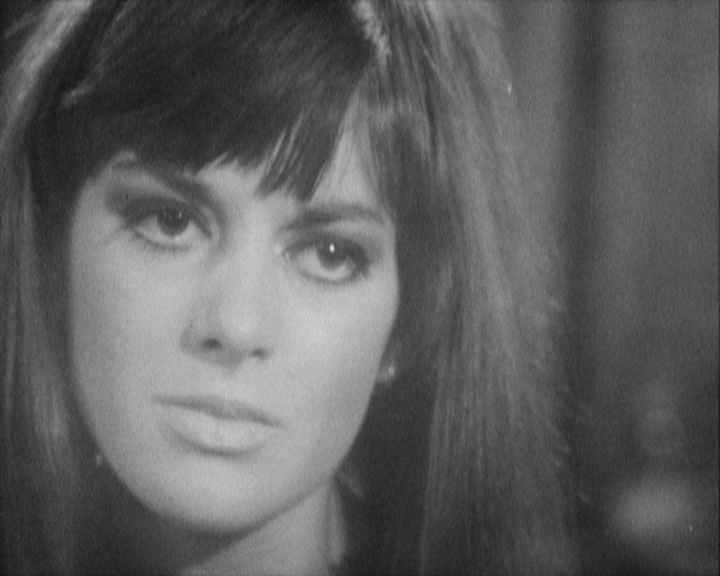 phoning in an interview about his intentions for the shocking broadcast, which motivated hundreds of emotional phone calls. Also included is a 1989 Alan Clarke interview (10 mins.) about Elephant, conducted at a busy street corner in Los Angeles of all places. Finally, Part 12 of Out of His Own Light" (36 mins.) serves as a sort of epitaph for Clarke with Frears, Rudkin, Kelly, Molly Clarke, Ward, Leland, Chapman, Cox, Schumann, Greengrass, Oldman, Manville, and others ruminating on his final two projects before he died on cancer the following year. Manville in particular gets an interesting moment about how her most memorable scene ended up being cut, so be sure to watch the director's cut before you see this. Both projects are regarded as quite radical for their time, and it's no wonder they still continue to provoke shocked reactions and much discussion.
phoning in an interview about his intentions for the shocking broadcast, which motivated hundreds of emotional phone calls. Also included is a 1989 Alan Clarke interview (10 mins.) about Elephant, conducted at a busy street corner in Los Angeles of all places. Finally, Part 12 of Out of His Own Light" (36 mins.) serves as a sort of epitaph for Clarke with Frears, Rudkin, Kelly, Molly Clarke, Ward, Leland, Chapman, Cox, Schumann, Greengrass, Oldman, Manville, and others ruminating on his final two projects before he died on cancer the following year. Manville in particular gets an interesting moment about how her most memorable scene ended up being cut, so be sure to watch the director's cut before you see this. Both projects are regarded as quite radical for their time, and it's no wonder they still continue to provoke shocked reactions and much discussion. ![]()